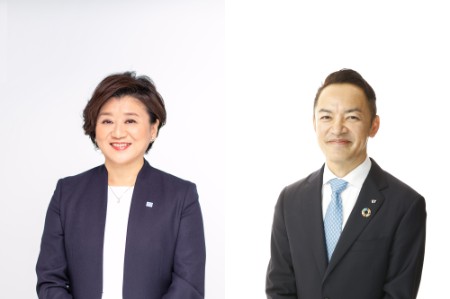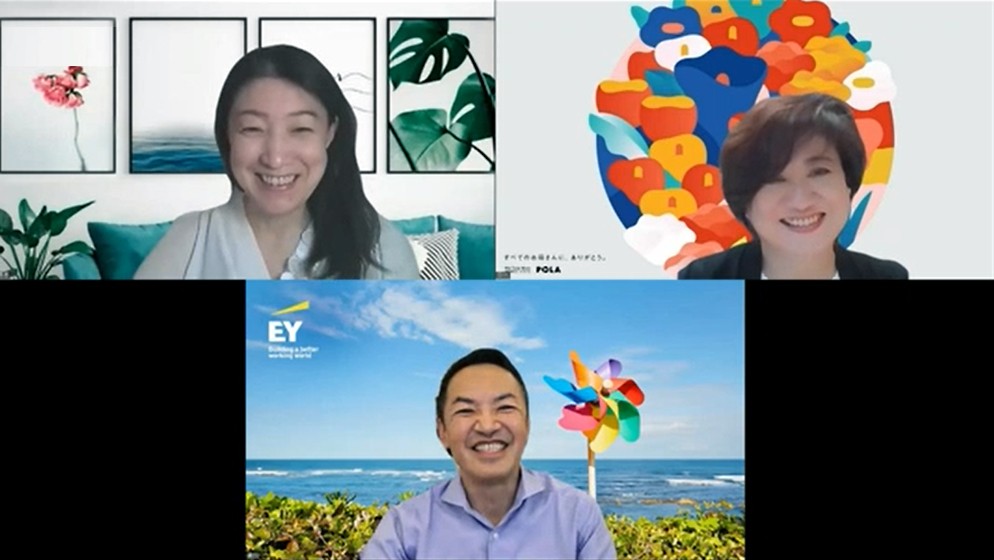With the EY purpose of Building a better working world, we do business with a focus on the actions of our members. Moriaki Kida, EY Japan Chairperson & CEO, participated in a discussion at the invitation of Miki Oikawa, CEO of POLA Inc., who is working to develop a workplace that is inclusive and psychologically safe. This was facilitated by Tsukiko Tsukahara, President of Kaleidist K.K., which specializes in advising government organizations, companies and university research institutes about diversity and inclusion (D&I).
The challenge of revealing ordinary emotions and uncertainties
EY has defined its purpose, and the corporate philosophy of POLA Inc., where Miki Oikawa serves as CEO, is “Science. Art. Love. Creating everlasting happiness among people and communities wishing for beauty and health.” There are many similarities in the aspirations of EY and POLA.
Tsukahara: In today’s discussion, we will hear from Miki Oikawa from POLA about the challenges she experienced as a woman, and from Moriaki Kida about the discrimination he faced because of his sexuality. We will also consider specific actions for D&I that can be taken both as individuals and as managers. I’d like to start by asking each of you about what inspired your approach and your path to self-acceptance.
Oikawa: In my case, the issue of gender is omnipresent but just before and after giving birth I first felt unable to fully assert myself. I had no choice but to work shorter hours but being unable to work like everyone else was discouraging and made me lose confidence. Confronted with the issues of my gender and of being a mother, I withdrew into my shell.
Another example is that even when I became a manager and attended meetings as an executive, I was continuously referred to as the “sole woman,” especially outside the company. I was uncomfortable with this, and I felt confused as to whether my statements were my own personal opinions or a representative voice for all women. I realized that I was searching for an ideal response on behalf of others.
Tsukahara: What gave you the strength to break away from this?
Oikawa: More than strength, I had the revelation that it was important to assert that I am an individual, more so than being the “sole woman.” I was in my early 40s at the time and was exhibiting the authentic and typical emotions and uncertainties of working people around my age. When I did that, there was always someone who would take the effort to listen to my thoughts and opinions as someone coming from the minority. Looking back, I think that the combination of my decision to be authentic and the acceptance of those around me enabled me to overcome these barriers.
Tsukahara: Kida-san, what has been your experience?
Kida: My career spans 25 years, but I have been fully self-aware for less than a decade. As a gay man and an Asian, growing up and working outside Japan, I was part of a double minority for a very long time. Whenever I attended a meeting or worked as part of a team, I constantly worried if I was being accepted by the people around me. I progressed in my career but was always considering the perspective of those in the majority.
That changed six years ago when I returned to Japan. Suddenly, I was no longer part of an Asian minority and, in addition, others listened to my opinions because I am a man. The culture shock was huge. I also realized that having others listen to my opinion was probably a privilege that came from being part of the majority.
Tsukahara: How much did your position change simply because you were working with other Japanese people?
Kida: The attributes of the majority and the minority will change, depending on the relative position of whoever defines them. I believe that everyone can simultaneously be a member of both the majority and the minority. However, those in the majority rarely have an awareness of this, so they don’t have the opportunity to realize that they are privileged and are likely unaware of their assertions. Minorities, on the other hand, feel the existence of that privilege every day.




